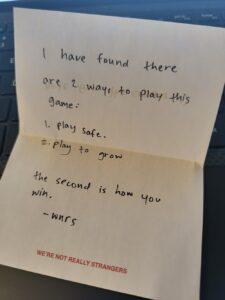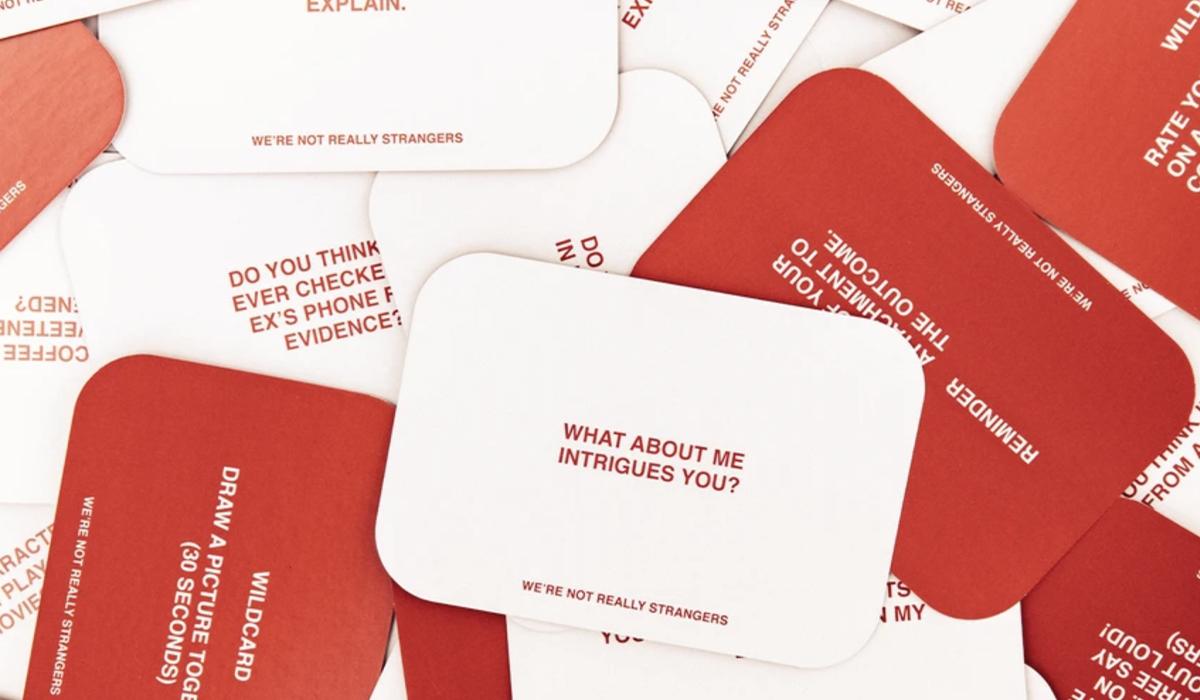Theme
My team’s game seeks to build trust among players, so what better game to play than We’re Not Really Strangers (WNRS), to analyze what mechanics they use to achieve a similar objective? We’re Not Really Strangers is a game created by Koreen Odiney that facilitates meaningful connection. The goal is to deepen existing relationships and be open to creating new ones. Players take turns picking cards and answering the questions on the cards. These cards are organized into three different levels: 1. Perception (impressions of yourself and others), 2. Connection (an emotional dive into each other’s experiences), and 3. Reflection (reflecting on the conversations and topics that came up throughout the game). These levels constitute a dynamic model which encourage individuals to challenge themselves to be vulnerable with other players.
Mechanics
I played in a group of 8 people at this week’s game night, most of whom I’ve never met before. Among two players, it’s easy to simply take turns choosing from the deck and answering the questions, but in a group this large, we had to get creative. We had one person pick a card from the deck (without looking). For level 1 (perception), we had the person whose turn it was, answer the question, as well as have the person next to them pick someone else from the circle to answer the question about the chosen person as well. In this way, we each got to take turns answering questions about someone else. This mechanic of having two people answer for level 1, was interesting especially because I didn’t know any of the other players very well. Each person’s answer was a reminder that first impressions can be deceiving, and we truly don’t know a person’s story unless we take intentional time to listen. For level 2 (connection), the person who chose the card answered the question themselves, and dug a little deeper into their past experiences and character than they did for level 1 questions. Unfortunately, we did not have time to get to level 3 questions, and decided against moving onto that round because we felt that level 2 questions were a sweet spot of getting to know each other better (level 3 cards seemed to focus more on internal self-reflection, something that requires much more time and solitude than we could afford).
(I didn’t get to take pictures of the actual cards since only one person was dealing them / reading them out loud, but I found the cards I found the most amusing and interesting on a Quizlet deck.)





WNRS includes a dig deeper card that can be used by any player at any point in the game, as a way to signal to the person whose turn it is, to elaborate on their answer. It’s also up to the players when to move on to a different level of questions. WNRS recommends answering at least 15 cards per level before moving on to the next level, to slowly build up trust between players.

(Source here)
Fun for the player
I’d say the fun manifests through Challenge, Narrative, Discovery, and Fellowship. It’s quite Challenging to be vulnerable and open up about yourself to another person, let alone 7 other people. For those who are more introverted (such as myself), their timidity can appear as disinterest or distrust, but in reality, is rooted in the hesitance to open up to those that they aren’t familiar with. However, this is also what makes the game fun – getting out of one’s comfort zone is important to personal growth. The game’s obstacles mostly arise from deep, personal questions that are picked randomly with no way to plan ahead. However, the more determined a player is to overcome this challenge, the more chances they’ll have to realize that they have more in common with other players than they originally thought (that really, they aren’t really strangers…)
The fun found through Narrative is interwoven with Challenge, since the game encourages players to share their stories and narratives. For example, a question like, “Do you think I’ve ever been in love?” or “What was your first impression of me?” can open up stories about past relationships, what players have learned from them, and more, to stories about how they think their introverted or extraverted personality has evolved since childhood. We found more fun through Narrative by supporting the mechanic of having another person choose someone to answer a question about the chosen player (discussed in the previous section), since the person answering the question about another person had to explain why they responded the way they did, and recount any narratives they had about the other person, if applicable. Especially because I barely knew anyone before playing this game with others, I found it very entertaining Discovering different parts of everyone’s personalities. It’s incredible how a simple question can prompt the player to tell us about the struggles they’ve had as a student at Stanford, what their future career goals are, and how they’ve been lately, in terms of their mental and emotional health. Though the idea of playing with complete strangers may seem daunting at first, the game is designed well – each person is encouraged to be vulnerable, which discourages any judgment in the space because we all know that we’ll have to answer truthfully about ourselves, as well.
Lastly, there is a great deal of Fellowship within the game that makes WNRS fun. Especially when we were in the phase of the game where we answered questions about each other, we got to learn more about people’s senses of humor, fashion, and upbringing. I think the Fellowship is built upon the foundation of vulnerability in the game. For example, one of the most important formal elements of games is a definitive objective. However, WNRS does not define such an objective, but rather a handwritten note from the creator of the game that leaves it up to the players: “I have found there are 2 ways to play this game: 1. play safe, 2. play to grow. The second is how you win.”

(Source for image above here.)
The objective of the game isn’t to construct objects in a competitive environment like in Catan, or race towards the finish line like in Mario Cart, but rather to assess and reflect on one’s character and past experiences, and ask others to do the same. This is one of the only games I’ve played in which “winning” the game isn’t about leveling up or being the last one remaining, but rather based on cooperating with others to facilitate a safe space in which people can be vulnerable with each other. Fellowship arises from uncovering similarities that we share with one another, and affirming or validating insecurities that a player may share in that space. Getting to know people is a lot of fun for me, and I’m glad that this game encourages Fellowship and cooperation to create a space that everyone can feel safe in.
Abuse
Fortunately, this game doesn’t have many opportunities for abuse. As discussed previously, there is a dig deeper card that can be used at any time to ask a player to elaborate on their response. However, especially in a setting where you’re meeting people for one of the first times, it can be incredibly difficult and uncomfortable to elaborate because someone asked you to. Especially as the game progresses to level 2 questions, players may feel uncomfortable answering dishonestly but also uncomfortable sharing in the first place. I think the dig deeper card can be used to create fun in WNRS if all players consent to the card being used, and think it would be best especially in settings in which people know each other beyond acquaintance-level relationships. Otherwise, it’s not a good idea to use the card because it can pressure an individual to answer a question they aren’t ready to share about, or trigger them to have to reflect on a traumatic event that they weren’t ready to face.
How I’d redesign the game
I like this game a lot. There are few things I would change about the game. The first thing I’d change is having the ability to pass on questions. For example, I might not have a great response to, “When is the last time you felt lucky to be you?” but the person to the left of me, might. Players should have the ability to pass the question onto another person if they feel that they aren’t able to provide an answer that allows them to be vulnerable or share more about themselves beyond the surface level. Next, I’d also change the game so that people can ask follow-up questions after someone responds. The person is only obligated to answer the follow-up questions if they want to, but this can provide an extra layer of vulnerability and Discovery for the players if they want to hear more about a person’s story. Lastly, this last change is not much of a redesign, but rather a suggested mechanic to keep in mind. It would be wise to play in smaller groups of around 2-3 people, because I think that’s the primary way one can get the most out of this game. The more people there are, the less likely it is that there will be intimate conversations. Because this game is geared towards understanding those you don’t know well or those you know well, on a deeper level, players may feel more safe and comfortable in smaller settings.




